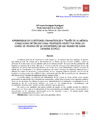Identificador persistente para citar o vincular este elemento:
https://accedacris.ulpgc.es/jspui/handle/10553/107164
| Campo DC | Valor | idioma |
|---|---|---|
| dc.contributor.author | Rodríguez Rodríguez, María Nayra | en_US |
| dc.contributor.author | Sosa Chacón, Naila Maninidra | en_US |
| dc.date.accessioned | 2021-05-10T13:16:27Z | - |
| dc.date.available | 2021-05-10T13:16:27Z | - |
| dc.date.issued | 2018 | en_US |
| dc.identifier.issn | 2560-4163 | en_US |
| dc.identifier.other | Dialnet | - |
| dc.identifier.uri | https://accedacris.ulpgc.es/handle/10553/107164 | - |
| dc.description.abstract | El objetivo principal de nuestro estudio de campo con los alumnos del curso intensivo de verano, que oferta el Aula de Idiomas de la Universidad de Las Palmas de Gran Canaria (ULPGC), radica en potenciar la música como recurso didáctico para la correcta adquisición de conocimientos gramaticales del español considerados de especial dificultad a la hora de abordar el estudio de nuestra lengua: el uso del subjuntivo, los pronombres personales átonos y los verbos ser y estar. Pretendemos, además, estimular el interés por la investigación y la autonomía personal, así como incentivar las relaciones interculturales y reforzar los valores de tolerancia y compañerismo. Es una propuesta didáctica aplicada para el aula de español como lengua extranjera (ELE) dirigida a estudiantes del nivel B2 de acuerdo con las orientaciones del Marco Común Europeo de Referencia para las Lenguas (2002). A grandes rasgos, se propone una metodología activa, donde las tareas actúan como núcleos generadores de adquisición de la competencia comunicativa, aplicándose la teoría de los supuestos prácticos como son las canciones. Por último, en cuanto a la metodología de la investigación, nos detendremos en la presentación de los fundamentos teóricos, así como en los planteamientos metodológicos, que consideramos fundamentales, puesto que ellos cimientan nuestra propuesta.En cuanto a los resultados de nuestro estudio de campo, se han podido cumplir los objetivos marcados en un inicio, esto es: la adquisición de los conocimientos gramaticales fijados y la consecución e incentivación de las relaciones interculturales entre los discentes, gracias a la anteriormente citada metodología implementada en el aula de ELE.Palabras clave: interculturalidad, canciones, gramática, léxico. | en_US |
| dc.description.abstract | The aim of the study is to enhance music as a didactic resource for the correct acquisition of grammatical knowledge of Spanish considered problematic at the time of approaching the study of our language: the use of the subjunctive, the unstressed personal pronouns and the verbs ser and estar. We also try to stimulate interest in research and personal autonomy, as well as encouraging intercultural relations and reinforcing the values of tolerance and camaraderie. It is a didactic proposal for the classroom of Spanish as a foreign language (ELE) aimed at students of level B2 in accordance with the guidelines of the Common European Framework of Reference for Languages.Broadly speaking, an active methodology is proposed, where tasks act as acquisition engines of communicative competence, applying the theory of practical assumptions such as songs. Finally, regarding the research methodology, we will stop at the presentation of the theoretical foundations, as well as the methodological approaches, which we consider fundamental, since they are the foundation of our proposal.Regarding the results of our field study, we have been able to meet the aims set at the beginning, that is: the acquisition of fixed grammatical knowledge and the achievement and encouragement of intercultural relations among students, thanks to the mentioned methodology implemented in the ELE classroom.Key words: interculturality, songs, grammar, lexicon. | en_US |
| dc.language | spa | en_US |
| dc.relation.ispartof | Beoiberistika | en_US |
| dc.source | Beoiberistika [ISSN 2560-4163], v. 2 (1), p. 193-200 | en_US |
| dc.subject | 5701 Lingüística aplicada | en_US |
| dc.subject | 620306 Música, musicología | en_US |
| dc.subject.other | Interculturalidad | en_US |
| dc.subject.other | Canciones | en_US |
| dc.subject.other | Gramática | en_US |
| dc.subject.other | Léxico | en_US |
| dc.subject.other | Interculturality | en_US |
| dc.subject.other | Songs | en_US |
| dc.subject.other | Grammar | en_US |
| dc.subject.other | Lexicon | en_US |
| dc.title | Aprendizaje de cuestiones gramaticales a través de la música como nexo intercultural. Propuesta didáctica para un curso de verano de la Universidad de Las Palmas de Gran Canaria (ULPGC) | en_US |
| dc.title.alternative | Learning Grammatical Topics through Music as an Intercultural Link. Didactic Proposal for a Summer Course at the University of Las Palmas de Gran Canaria | en_US |
| dc.type | info:eu-repo/semantics/Article | en_US |
| dc.type | Article | en_US |
| dc.identifier.url | http://dialnet.unirioja.es/servlet/articulo?codigo=7896677 | - |
| dc.description.lastpage | 200 | en_US |
| dc.identifier.issue | 1 | - |
| dc.description.firstpage | 193 | en_US |
| dc.relation.volume | 2 | en_US |
| dc.investigacion | Artes y Humanidades | en_US |
| dc.type2 | Artículo | en_US |
| dc.contributor.authordialnetid | 3560880 | - |
| dc.contributor.authordialnetid | No ID | - |
| dc.identifier.dialnet | 7896677ARTREV | - |
| dc.utils.revision | Sí | en_US |
| dc.identifier.ulpgc | Sí | en_US |
| dc.contributor.buulpgc | BU-HUM | en_US |
| item.fulltext | Con texto completo | - |
| item.grantfulltext | open | - |
| crisitem.author.dept | GIR IATEXT: División de Estudios de Corpus y Lingüística Aplicada | - |
| crisitem.author.dept | IU de Análisis y Aplicaciones Textuales | - |
| crisitem.author.dept | Departamento de Filología Hispánica, Clásica y de Estudios Árabes y Orientales | - |
| crisitem.author.orcid | 0000-0003-0518-2547 | - |
| crisitem.author.parentorg | IU de Análisis y Aplicaciones Textuales | - |
| crisitem.author.fullName | Rodríguez Rodríguez, María Nayra | - |
| Colección: | Artículos | |
Los elementos en ULPGC accedaCRIS están protegidos por derechos de autor con todos los derechos reservados, a menos que se indique lo contrario.
